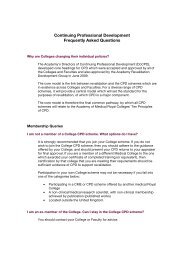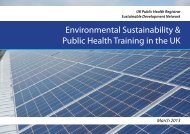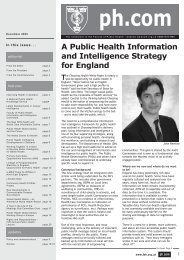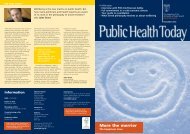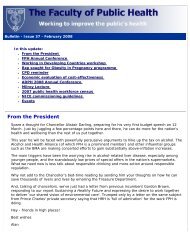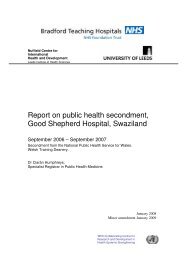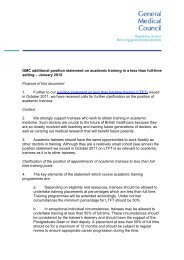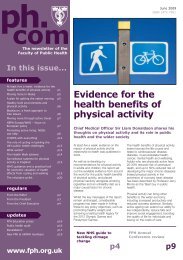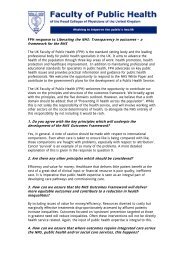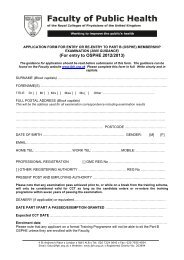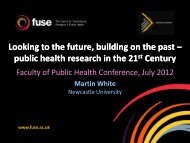A Chronology of State Medicine, Public Health, Welfare and Related ...
A Chronology of State Medicine, Public Health, Welfare and Related ...
A Chronology of State Medicine, Public Health, Welfare and Related ...
You also want an ePaper? Increase the reach of your titles
YUMPU automatically turns print PDFs into web optimized ePapers that Google loves.
Charles Hastings (1794-1866); in 1855 it became the British Medical Association.<br />
1832 Cont - 1834<br />
1832 cont Durham University received its charter.<br />
Bristol Medical School founded.<br />
Manchester Statistical Society founded.<br />
York Medical Society founded.<br />
"The Moral <strong>and</strong> Physical Condition <strong>of</strong> the Working Classes employed in Cotton<br />
Manufacture in Manchester", by JP Kay (1804-77, later Sir James Kay-Shuttleworth),<br />
published. See 1838.<br />
1833 Abolition <strong>of</strong> slavery.<br />
Mills <strong>and</strong> Factories Act (3&4 Will.IV, c.103) (Althorp's Act) repeated <strong>and</strong> extended the<br />
act <strong>of</strong> 1831. Younger children were to attend school for at least two hours on six days a week,<br />
<strong>and</strong> holidays for the children <strong>and</strong> young persons to be all day on Christmas Day <strong>and</strong> Good<br />
Friday, <strong>and</strong> eight half days. The Act gave powers for the appointment <strong>of</strong> inspectors, because<br />
provisions <strong>of</strong> previous acts "were not duly carried into execution, <strong>and</strong> the Laws for the<br />
Regulation <strong>of</strong> the Labour <strong>of</strong> Children in Factories have been evaded". The inspectors (four<br />
were appointed) were empowered to enter any factory at any time <strong>and</strong> to examine therein the<br />
children <strong>and</strong> other young persons <strong>and</strong> to enquire about their condition, employment <strong>and</strong><br />
education. Children under the age <strong>of</strong> 13 years had to be certified by a physician or surgeon as<br />
being "<strong>of</strong> the ordinary strength <strong>and</strong> appearance" <strong>of</strong> a child <strong>of</strong> his/her stated age. See 1844.<br />
Burgh Reform Act (3&4 Will.IV, c.46) reformed the Burghs in Scotl<strong>and</strong> <strong>and</strong> enabled<br />
them to establish a general system <strong>of</strong> police.<br />
For the first time the Government allocated a grant <strong>of</strong> £20,000 towards erecting Church<br />
<strong>of</strong> Engl<strong>and</strong> schools (later extended to Catholic <strong>and</strong> Non-Conformist schools), provided that at<br />
least half <strong>of</strong> the cost <strong>of</strong> the building had been raised by private subscription. See 1839.<br />
A Select Committee <strong>of</strong> the House <strong>of</strong> Commons recommended state registration <strong>of</strong><br />
births, marriages <strong>and</strong> deaths. See 1836.<br />
University College Hospital, London, founded.<br />
"The Manufacturing Population <strong>of</strong> Engl<strong>and</strong>. Its Moral, Social <strong>and</strong> Physical Condition",<br />
by P Gaskell, published.<br />
1834 Poor Law Amendment Act (4&5 Will.IV, c.76) followed the publication <strong>of</strong> the Report<br />
<strong>of</strong> the Royal Commission on Poor Law (1832-4). The Act limited outdoor relief to the aged<br />
<strong>and</strong> infirm who were "wholly unable to work"; encouraged the building <strong>of</strong> workhouses, <strong>and</strong><br />
introduced a spartan regime <strong>and</strong> the "Workhouse Test"; <strong>and</strong> considered any relief given to be<br />
a loan. The Act required wards to be set aside for the impoverished sick <strong>and</strong> empowered<br />
justices <strong>of</strong> the peace to give an order for medical relief to any poor person with "sudden <strong>and</strong><br />
dangerous illness". The Act set up the Poor Law Commission to consist <strong>of</strong> three<br />
commissioners to supervise the implementation <strong>of</strong> the act, the first secretary <strong>of</strong> the<br />
Commission was Edwin Chadwick (1800-90). Boards <strong>of</strong> Guardians were encouraged to<br />
combine into Unions to build the workhouses. Disraeli proclaimed that the new law was<br />
"announcing to the world that in Engl<strong>and</strong> poverty was a crime". See 1844.<br />
Chimney Sweeps Act (4&5 Will.IV) forbade the apprenticing <strong>of</strong> any boy under the age<br />
<strong>of</strong> 10 years, <strong>and</strong> the employment <strong>of</strong> children under 14 in chimney sweeping unless they were<br />
apprenticed or on trial. The apprentices were not to be "evil treated" by their employers, <strong>and</strong><br />
any complaints <strong>of</strong> the children were to be heard by justices <strong>of</strong> the peace. The act was largely<br />
ineffective as there were no means <strong>of</strong> enforcement. See 1840.



